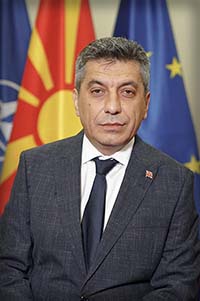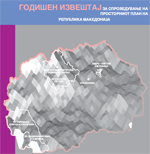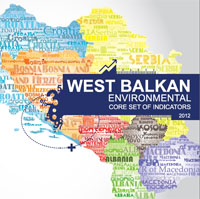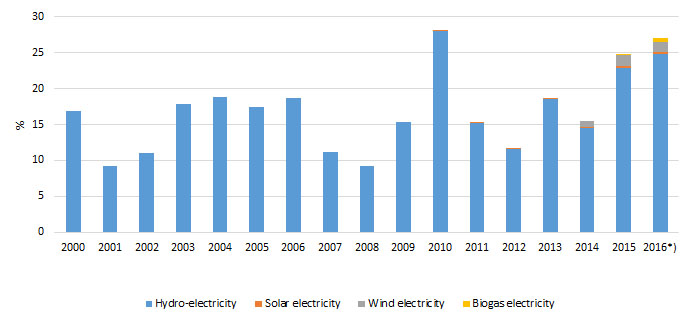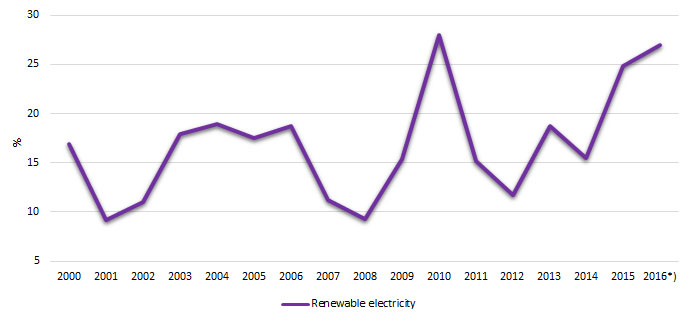| RENEWABLE ELECTRICITY |
Renewable electricity sources are defined as renewable non-fossil sources of energy, such as: hydropower, geothermal, solar and wind power; solid biomass; biogas, liquid biofuels, etc.
The indicator “Renewable electricity” measures the share of electricity produced from renewable sources in gross national electricity production (in percentage).
The gross national electricity consumption is a sum of the total gross production and import of electricity minus electricity exported.
- GWh
- percentage
What is the share of electrcity originating from renewable sources in the gross electricity consumption in the Republic of Macedonia?
The share of electrcity originating from renewable sources in the gross electricity consumption in the Republic of Macedonia is rather low. It makes relatively high annual fluctuation depending on hydrological conditions, considering that so far only hydro and solar power from among renewable sources contribute to electricity production from renewable sources. Efforts should be made to utilize other renewable sources for electricity production.
There was a variable trend in the rate of renewably energy sources utilization during the analyzed period. In 2010, resulting from favourable hydrological conditions, the share of renewable electricity in the total gross electricity consumption was the highest amounting 28%, while the lowest share was recorded in 2001 amounting 9.2%.
Figure 1. Shareof renewable electricity in gross domestic electricityconsumption
Figure 2. Trend in electricity production from renewable sources (%)
Data coverage: excel
Source: State Statistical Office, http://www.stat.gov.mk/Default_en.aspx
The production of electricity from renewable sources in the Republic of Macedonia is based on the hydropower, but in the last years, a contribution has been noted by new renewable sources (solar electricity plants, windmills and biogas plants, as well as an increase in the share from small hydropower plants).Production in large hydropower plants is predominant.
At present, the share of renewable electricity in the overall electricity consumption is very important and depends on hydrological conditions during the year. Variable hydrological conditions result in variations in the production of hydro energy due to lower quantities of precipitation. This indicates the fact that there is a need for larger investments in energy production capacities to enable an increase of the utilization of other renewable energy sources as well, such as solar,wind power and biogas.
During the observed period, there was a variable trend of utilization of energy from renewable sources. In 2010, resulting from favourable hydrological conditions, the share of renewable electricity in the total gross electricity consumption was the highest amounting 28%, while the lowest share was recorded in 2001 amounting 9.2%.
- Methodology for the indicator calculation
Statistical methodology for calculation:
- Common surveys for coal, oil, natural gas, electricity and heat, renewable energy for 2005 by Eurostat, ECE/UN and IEA/OECD.
- “Energy Statistics Methodology Eurostat F4, 1998″
- Strategy for Renewable Energy Sources Utilization in the Republic of Macedonia by 2020[1]
- National Strategy for Sustainable Development in the Republic of Macedonia 2009 – 2030[2]
- Strategy for Energy Efficiency Promotion in the Republic of Macedonia by 2020[3]
- Strategy for Energy Development in the Republic of Maceodnia by 2030[4]
Legal grounds
Law on Energy; Energy Balance of the Republic of Macedonia – annual planning document defining the demands for energy and the possibility for their supply (Article 16 of the Law on Energy).
[1]http://www.economy.gov.mk/dokumenti/strategii/3102.html [2]https://arhiva.moepp.gov.mk/wp-content/uploads/2014/12/Nacionalna-Strategija-za-Odrzliv-Razvoj-vo-RM-NSSD-Del-1.pdf [3]http://www.konkurentnost.mk/StrateskiDokumenti/StrategijazaunapreduvanjenaEERMdo2020godina.pdf [4]http://www.build.mk/docs/users/cloverstack/Strategija%20za%20razvoj%20na%20energetikata%202008-2020%20so%20vizija%20do%202030.pdfTo achieve the required increase in order to reach the EU indicative target of 21% share by 2020.
- Eurostat
- ECE/UN
- IEA/OECD
| Code | Title of the indicator | Compliance with CSI/ЕЕА or other indicators | Classification by DPSIR | Type | Linkage with area | Frequency of publication | |
| MKNI 031 | Renewable electricity | CSI 031
EE 27 |
Renewable electricity | R | B | energy | annualy |






